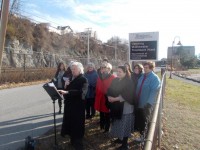Local Government Takes Steps to Ban Use of Fracking Waste

On December 10, the Westchester County Board of Legislators unanimously approved legislation that bans the sale, application and disposal in the county of waste from natural gas drilling operations. Penalties for violations, which are unclassified misdemeanors, will include fines upwards to $25,000 and/or imprisonment up to 30 days.
The bill received prior approvals in the Government Operations Committee, chaired by Legislator Catherine Borgia (D-Ossining), who was a co-sponsor; and the Legislation Committee, chaired by Legislator Bill Ryan (D-White Plains).
The various waste products from natural gas drilling, or hydraulic fracturing, include water laden with chemical additives, naturally occurring radioactive materials and heavy metals, along with leachate from solid wastes. The new legislation specifically prohibits the introduction of hydrofracking waste into wastewater treatment and sewage treatment facilities within Westchester or operated by the county; the sale of such waste within the county; and the application of natural gas waste to any roadway or property (usually as a means to control ice and dust) within the county.
The legislation further states that all bids and contracts related to the purchase or acquisition of materials to be used to construct or maintain a county road shall include a provision stating no materials containing fracking waste shall be provided to the county.
Following the BOL vote NYS Assemblywoman Sandy Galef (D-Ossining) announced on December 12 that she plans to introduce legislation that will prohibit the use of hydrofracking waste byproducts at the state level. She expects to submit the measure when the new legislative session begins next month.
Galef said natural gas companies that have been hydrofracking in other states have been selling the wastewater to municipalities and states to use as a road deicer or dust reducer. Much of the water, referred to as brine, is full of toxic chemicals that is used to blast through the layers of the earth. When it comes back to the surface, companies collect the water and either sell it or give it away. It can enter wastewater treatment plants, which don’t have the capacity to treat the more corrosive water, she said.
“We are doing this to complement what Westchester County did (last) Monday and they passed unanimously a local law to prohibit the use of brine on county roads,” Galef said while accompanied by Assemblyman Thomas Abinanti (D-Pleasantville), County Legislator Catherine Borgia (D-Ossining) and a group of fracking opponents. “We’re just enhancing that to say state roads.”
While there is no hydrofracking in New York State despite a big push from the natural gas industry, the lawmakers agreed a preemptive move was needed as a precautionary measure. In 2008, there were 242,769 lane miles of state road in New York.
“We felt that this was a very smart thing to do in order to sort of cut off problems at the pass before they really begin,” Borgia explained. “Even if New York State decides to have fracking… we’re very close to Pennsylvania, we know that this is a problem the industry has, of how to get rid of this waste.”
Abinanti said the state needs to send a message that it is serious about refusing to risk the health of its citizens and its water supply.

